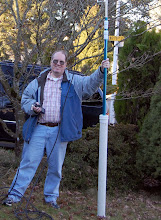
The ham radio ranks continue growing in the Northwest. Over the past several months I've analyzed the number of ham licensees as the basis for a class project in school. I found the analysis both interesting and challenging.
The ham population roughly tracks the general population in the Northwest (defined and Oregon and Washington for this purpose), although there are anomalous pockets.
The map above shows the high ham concentration in three Puget Sound counties. The Portland metro area and Spokane also have high ham numbers. Two counties in SE Washington and three in North Central Oregon have very low numbers. These counties might be places to operate during state QSO parties or during county hunter activities. I expect quite a few folks would appreciate a few stations operating from those counties.

I found the map below much more interesting. The map shows the number of hams per thousand in the general population (based on the 2008 US Census county estimates). On the low end, many counties with low ham numbers also have low numbers per thousand. This may simply be the result of few hams who talk about their hobby, so few folks in the county get interested.
On the other side, the coastal counties of NW Washington and NW Oregon stand out. I know several clubs along the coast actively seek out hams for emergency communications, and local newspapers wrote several stories on ways hams helped their communities during storms.
Both Oregon and Washington have some of the highest ham population growth over the past several year, surpassed only by Utah, Idaho, and Nevada.




